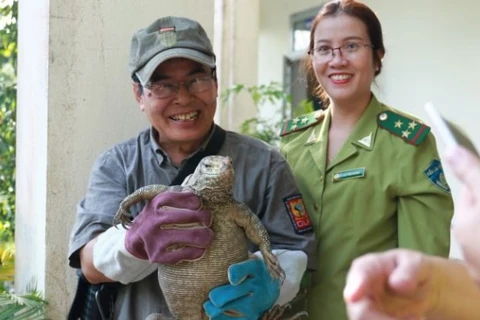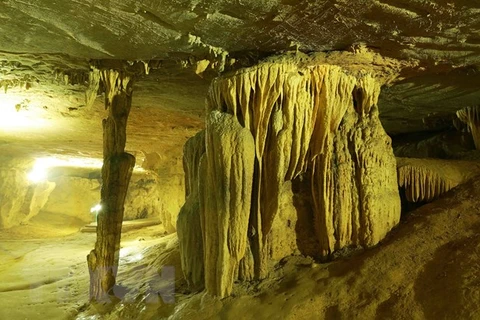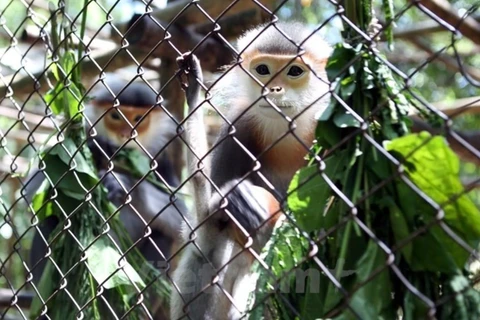 Over the past 10 years, many conservation initiatives and solutions have contributed to effectively protecting biodiversity in Vietnam. (Photo: Hung Vo/Vietnam+)
Over the past 10 years, many conservation initiatives and solutions have contributed to effectively protecting biodiversity in Vietnam. (Photo: Hung Vo/Vietnam+) Hanoi (VNA) - Each person can contribute to biodiversity conservation by rationally using natural resources, not exploiting, trading, storing or consuming wild animals.
According to the Department of Nature Conservation and Biodiversity under the General Department of Environment, Vietnam is one of the most biologically diverse countries in the world.
However, like many other countries in the world, Vietnam is facing a rapid decline and degradation of biodiversity. Therefore, in order to effectively preserve the "treasure" of biodiversity, it is necessary for the whole society to join hands in this field.
Vietnam is one of 12 centres for biodiversity in the world, with a rich and diverse range of rare and precious gene sources.
With the goal of conserving and sustainably developing the natural resources for socio-economic development strategies and environmental protection, the Ministry of Natural Resources and Environment has focused on building and completing the legal system on biodiversity and launched a biodiversity conservation plan around the country.
So far, 173 conservation areas have been formed, including 33 national parks, 66 nature reserves, 18 species/habitat conservation areas, and 18 landscape protected areas.
The county also has nine wetland areas recognised as Ramsar sites of the world; meanwhile 23 provinces nationwide have approved the provincial and municipal biodiversity conservation plans.
However, like many other countries in the world, Vietnam is facing a rapid decline and degradation of biodiversity. The identified reason is that the pressure of population growth has led to high demand for natural resource consumption.
In addition, rapid urbanisation, underdeveloped status, change of land use practices, and the building of many infrastructures have significantly reduced the area of natural habitat, increasing the division of ecological systems and the decline of living environments for many wide animals and plants.
The more complicated wildlife exploitation, trade and consumption has caused a great threat to biodiversity, affecting Vietnam’s image in the international arena.
According to the report of the United Nations Environment Program (UNEP), there are five main causes for biodiversity loss from humanity: the change of land use demands; the overexploitation of wild animals and plants; climate change; environmental pollution; and invasive alien species.
Meanwhile, the globalisation process has increased the movement of species beyond their natural bio-geographical barriers through tourism and trade activities, disrupting the indigenous ecosystems and living environments of creatures.
In order to conserve biodiversity, Vietnam has over the past decade developed and actively implemented the National Strategy on Biodiversity to conserve and restore the value of biodiversity. In addition to the role of government agencies, many efforts come from the non-state sector, especially from NGOs, development organisations and the community.
The legal system on biodiversity conservation and protection of wild species has been further adjusted.
Along with the improvement of legal system on forest protection and development (Law on Forest Protection and Development 2004, Law on Forestry 2017), legislation on fisheries (Law on Fisheries 2004 and revised law 2017), legislation on investment and business (Law on Investment 2014), the Law on Biodiversity 2008 is the most comprehensive legal document on conservation and sustainable development of biological species, and endangered, precious and rare species.
A series of policies, decrees and circulars guiding the implementation of the law have created a fairly complete legal framework for wildlife management.
However, the Department of Nature Conservation and Biodiversity also noted that besides the achievements, Vietnam still has faced many challenges that need to be solved.
It is also crucial for the country to strengthen the control of collection, transportation and treatment of waste; focus on thoroughly solving the issue of environmental pollution due to waste that is directly affecting the lives and livelihoods of people; and encourage the construction of environmental protection projects to serve the community’s interests.
The relevant agencies should pay strong attention to raising public awareness of not hunting for rare or endangered animals as well as not exploiting and exhausting natural resources.
The organisations, individuals and enterprises that have made effective contributions to the rational use of natural resources, environmental protection, biodiversity conservation, sustainable production and consumption and climate change adaptation in localities should be promptly detected and praised.
The abovementioned practical and specific measures will contribute to improving the efficiency of biodiversity conservation towards sustainable development of the country and the world./.
.























